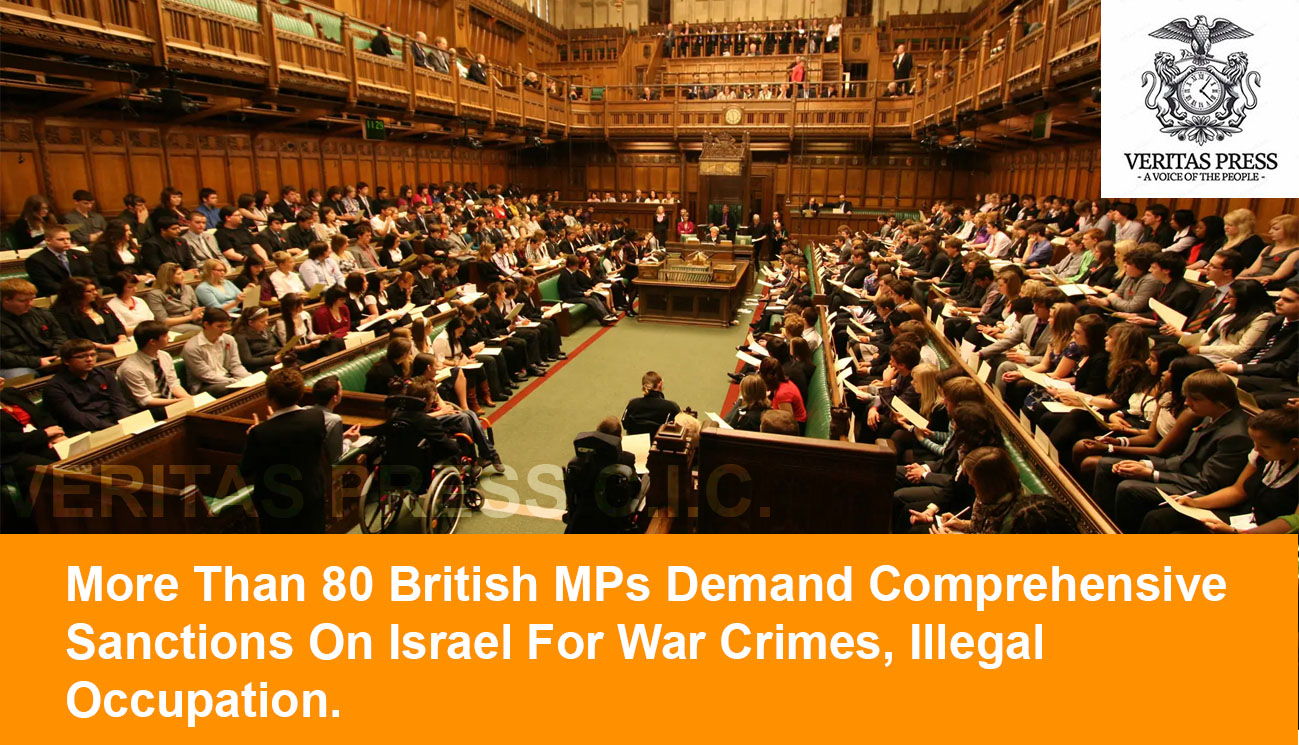In a major challenge to the UK government’s current stance on the Gaza war and the Israeli occupation of Palestinian territories, at least 84 British parliamentarians from across the political spectrum have called for sweeping sanctions on Israel. The move comes as the humanitarian catastrophe in Gaza deepens and amid growing global outrage over what many experts and legal bodies describe as Israel’s ongoing violations of international law and potential war crimes.
The joint letter, addressed to newly-appointed Foreign Secretary David Lammy, urges the Labour government to take decisive action in line with the International Court of Justice’s (ICJ) landmark advisory opinion, which declared Israel’s occupation of Palestinian territory “unlawful” and called for its termination “as rapidly as possible.”
Organised by MPs Richard Burgon and Imran Hussain, both now independent but formerly Labour, the letter has drawn signatures from a diverse array of political figures, including former Labour leader Jeremy Corbyn, former shadow chancellor John McDonnell, former shadow home secretary Diane Abbott, and Green Party co-leader Carla Denyer. Also among the signatories are MPs from the SNP, Plaid Cymru, the Liberal Democrats, and several Lords, including Baroness Sayeeda Warsi, a former Conservative peer turned vocal critic of Israel’s conduct.
From Words To Action:
The parliamentarians’ demands include:
- Suspension of the UK-Israel trade agreement until Israel complies with international law
- A complete ban on trade with illegal Israeli settlements in the occupied West Bank
- Sanctions against Israeli individuals and institutions complicit in war crimes
- An immediate end to arms transfers to Israel
“We cannot allow Israel to tear up the rule book of international law and simply go unpunished,” said Richard Burgon MP in a statement. “Our government has a legal and moral obligation to act. It needs to impose widespread sanctions to get Israel to end its war crimes and stop violating international law.”
Imran Hussain MP added, “The arrest warrants issued for war crimes must be just the start of renewed efforts to force Israel to abide by international law, stop the war crimes and end its illegal occupation of Palestine.”
A Legal Reckoning Approaches:
The letter was timed to coincide with the one-year anniversary of the ICJ’s advisory opinion, which declared that Israel’s prolonged occupation, now in its 58th year, violates international law. The ICJ further ruled that all states, including the UK, have a legal obligation not to recognise the situation arising from the unlawful occupation or provide aid or assistance in its maintenance.
“The UK government has repeatedly stated that it is committed to international law,” the MPs write. “Acting in support of the ICJ advisory opinion would be a critical step in demonstrating that commitment.”
The letter also points to international legal precedent and current mechanisms for accountability, noting that the UK cannot remain complicit, through arms sales, trade, or political cover, in supporting a regime the ICJ has deemed unlawful.
Government Under Pressure:
The Labour-led government has thus far taken only incremental steps. In September 2024, it suspended 30 out of 350 export licences for military equipment to Israel, far short of a full arms embargo. Last month, Foreign Secretary Lammy announced targeted sanctions against three Israeli settler outposts and four organisations involved in settler violence in the West Bank, calling them responsible for “heinous abuses of human rights.”
While these measures mark a rhetorical shift from the Conservative government’s policies, they fall short of the sweeping action demanded by MPs, legal experts, and civil society groups.
“It is no longer tenable to pretend that targeted sanctions and strongly worded statements are sufficient,” said a spokesperson for Palestinian Legal Aid UK. “This letter is an unequivocal call for the UK to align its foreign policy with international law and human rights, not with the perpetrators of war crimes.”
Mounting Global Pressure:
The UK is not alone in facing domestic pressure over its ties to Israel. In recent months, lawmakers in Ireland, Spain, Norway, South Africa, and Brazil have demanded similar sanctions or diplomatic measures. South Africa’s genocide case against Israel at the ICJ continues, with mounting evidence submitted by human rights groups and UN experts documenting starvation, forced displacement, and systematic destruction of civilian infrastructure in Gaza.
The UK government’s position has become increasingly isolated, particularly as civilian death tolls soar in Gaza. Over 100,000 Palestinians have been killed since October 2023, according to Gaza health authorities, with UN agencies warning that famine, disease, and collapse of medical services are now imminent in the enclave.
Divisions Within Labour:
The letter also highlights growing internal tensions within the Labour Party. While Foreign Secretary Lammy and Prime Minister Keir Starmer have maintained support for a “two-state solution” and Israel’s “right to self-defence,” critics argue this rhetoric serves to shield Israel from accountability.
At last year’s Labour Party conference, pro-Palestine motions were overwhelmingly supported by grassroots members, despite the party leadership’s attempts to steer the agenda. Many Labour MPs who signed the letter have voiced frustration over the party’s refusal to reflect the base’s widespread support for Palestinian rights.
Baroness Sayeeda Warsi, speaking from the House of Lords, echoed this frustration: “For too long, our foreign policy has turned a blind eye to Israeli impunity. This letter is a long-overdue step toward restoring our moral credibility.”
A Turning Point?
As the ICJ prepares for further hearings later this year on the legal consequences of Israel’s occupation, the question now is whether the UK government will act in accordance with the court’s findings or continue to pursue trade, arms, and political relations with a state that stands accused of genocide and apartheid.
Jeremy Corbyn, one of the letter’s signatories, said: “International law must apply to all. The people of Gaza and the West Bank are not an exception. If we don’t act now, we are complicit.”
The call for sanctions may not yet mirror a parliamentary majority, but it signals a growing consensus that Israel’s conduct can no longer be protected by diplomatic niceties. As the war in Gaza continues and settler violence intensifies in the West Bank, the UK faces a stark choice: uphold the rule of law, or continue to betray it.
Advertisements
Tags:






























Leave a Reply